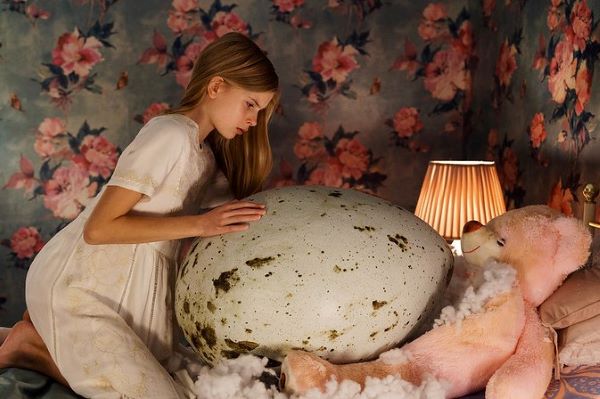As Carrie White could tell you, puberty can be a monstrous thing for a young girl to contend with. Tinja, the heroine of Hanna Bergholm’s phenomenal debut Hatching is also about to find this out the hard way. A coming-of-age horror fable with a dextrous multi-purpose metaphor at its core, it comes across as E.T. repurposed through the prism of Angela Carter‘s The Bloody Chamber. Sundance has been studded with fine debuts this year, and Hatching may be the best.
Tinja (newcomer Siiri Solalinna) is a willowy pre-teen gymnast in training for an upcoming competition. She’s very good, but it’s clear that Tinja’s assiduous training is purely to satisfy the vicarious desire of her domineering mother (Sophia Heikkilä). Tinja gets a glimpse of her mother’s nature when she catches a bird that’s flown into their home. Mother swiftly breaks the creature’s neck, much to the girl’s horror. She discovers an egg laid by the dead animal and her sweet, nurturing instinct takes over. In her care the egg grows. And grows. And grows. Until a baby bird the size of Tinja herself emerges. Tinja christens the creature Alli and becomes something of a surrogate mother to the screeching beast. That is until Alli starts to slowly change into a demonic twin of Tinja with an inexorable drive to punish all who have wronged her adopted sister.
Alli is a brilliant creation. Achieved through impressive practical effects, she disturbs instantly through the uncanny weirdness of avian bone structure blown up to human size. Imagine a baby Skeksis running on pure, primitive id, and you’re pretty much there. As the transformation gets fully underway, Solalinna takes over and gives a performance of impressive physicality that puts one in mind of Kathryn Hunter‘s contorted take on the three witches in The Tragedy of Macbeth. The relationship between Tinja and Alli allows Bergholm to play with different modes of body horror as normal female anxiety gets warped through the idea of the monstrous feminine. Most interesting is a subtext relating to eating disorders. Tinja comes to realise Alli will only eat Tinja’s regurgitated food (cue some disgusting sound design) which leads to a scene of binging and purging that may be the most traumatic moment of the film. The implication is of course that this may not be an unusual occurrence and is perfect example of the duality of the horror at work here. Tinja has been functioning previously on what she thinks her mother wants. She’s now suddenly operating on the basis of what she instinctively knows a child needs. Writer Ilja Rautsi‘s script is full of these ambiguities.
As with countless creature features right back to Phantom of the Opera and Frankenstein, we know that humans are ultimately the real monsters in these narrative. While Alli is a terrifying foil for Tinja, Sophia Heikkilä steals the film as the unnamed mother. Warped by past failures (a scar on her leg all the information we need of dashed sporting glory), she bends all aspects of her life to her will, including her family. With eyes blazing beneath a rictus grin her desire to be envied through her sickly blog and Stepford family, it’s not clear who is going to turn out to be the bigger threat to Tinja. But nothing is that simple in the word of Hatching. Mother is involved in an affair with a handsome handyman widower (Reino Nordin, clearly a nice person so you instantly fear for his safety and that of his adorable baby girl). There’s a potential hint of genuine bond between mother and daughter as Tinja discovers the affair and become a confidante. While again, there’s manipulation and deceit on mother’s part, a chance of genuine happiness would perhaps cause a softening, and the possibility that Tinja would cease to be the locus of her mother’s skewed attention.
Hatching jettisons some of its loaded subtext towards the end as it leans heavily into the insanity of its premise, but it is otherwise an astonishingly accomplished piece of work from all involved. The acting is great (special nod to Jani Volanen as the milquetoastiest of milquetoast husbands), the production design and the camera work outstanding, and the story is rich and fresh while paying just enough homage to its literary and cinematic forebears. It’s just sweet, sad and mad enough that it could become this generation’s Ginger Snaps. Like that classic, there’s a lightning-in-a-bottle spark of genius at work, and (at least to these jaded middle-aged male eyes) a wise and weary understanding of the highs and lows of femininity.
Screening as part of Sundance Film Festival 2022
